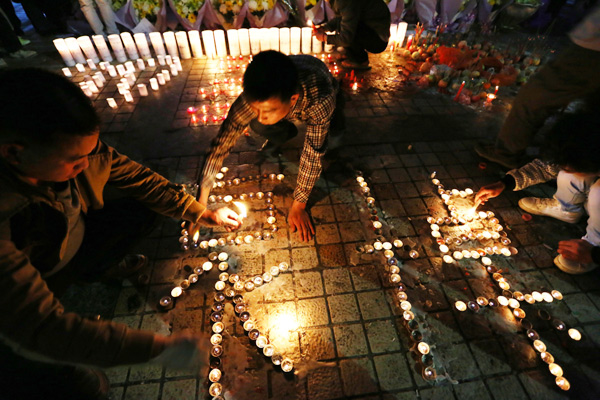Online videos help to spur terror attacks
By Cao Yin (China Daily) Updated: 2014-07-08 08:09
|
|
Ekrem Usman recalled in subdued tones how members of his terror cell were whipped into a frenzy to carry out a
|
Cleanup report More than 1,500 audio and video files involving terror and violence have been reported under a campaign launched on June 20 to tackle online terror-related files. Of these, 230 have been identified as valuable, according to the State Internet Information Office, the authority leading the online cleanup. More than 70 percent of the 230 that were identified came from overseas, including those instigating religious extremism and jihad (so-called holy war), the office said. Some of the information also instructs viewers how to buy weapons and showcase violent images, according to the authority, adding that several overseas websites even advocated terror attacks in China. The reported Chinese websites were found to be broadcasting information involving how to make explosives and buy prohibited articles, the office said. "The terror-linked information on these reported Chinese websites is implanted under what appear, at first glance, as normal headlines but they are hidden in other video products," the authority's spokesman said. The office has opened a public hotline, 12377, and those who report information that is deemed of value in the campaign against terror will be awarded 100,000 yuan ($16,000). The authority has issued warnings to the websites concerned. Anti-terrorism expert Li Sheng said that all terrorists had watched or listened to videos and audio products before they carried out attacks. Li Wei, an anti-terror specialist, agreed, adding that the reporting system is a key component and information must be exchanged between countries. - Cao Yin |
Rubbing his handcuffed hands, he confirmed he watched online videos repeatedly, sometimes with three or four others.
"I was excited after watching the videos. I was thirsty for jihad," he said, adding he even downloaded the video materials onto his mobile phone.
Like Usman, all of the terrorists had watched similar videos and listened to audio materials on the Internet before they committed brutal terror attacks, the State Internet Information Office said in June.
The SIIO aims to root out terror-related video and audio products online within six months with the cooperation of the Ministry of Public Security and Internet or technology giants such as Sina and Tencent.
Meanwhile, in a 24-minute documentary, made by the SIIO and China Central Television, anti-terrorism experts and police also said that online videos about the East Turkistan Islamic Movement had been a catalyst in a series of attacks since last year.
"How to strengthen the anti-terrorism fight via the Internet has become a major topic not only in China, but also across the world," said specialist Li Wei, who is an anti-terrorism researcher at the China Institutes of Contemporary International Relations and has issued several papers globally on how to tackle the scourge of terror.
International agreements, communication channels, and cooperation are vital in the campaign to tackle terrorism, he said.
Terror groups are no strangers to putting footage of their atrocities on the Internet but it is possible that they could, one day, use the actual web to conduct terror attacks, such as disabling power plants or causing travel mayhem, Li added.
- New scare hits fast food chains
- New scare hits fast food chains
- Syndrome killing young workers in 'world's factory'
- Anti-smog gains marred by rising ozone levels
- Lawyers trained to help deal with transnational cases
- Man saved from suicide kills himself
- 17 dead, 5million affected by Rammasun
- Namtso no longer Tibet's largest lake: research
- Red Cross defends use of winter quilts in summer
- Meat supplier of McDonald's, KFC suspended








